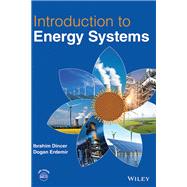An in-depth introduction to applications and analysis of energy systems, covering both renewable and traditional types of energy systems
In Introduction to Energy Systems, the content is uniquely designed to cover comprehensive descriptions and assessments of all the key types of energy sources, including fossil fuels-based, nuclear, and renewable energy systems, with a special focus on their design, analysis and assessment, technical and operational aspects, and applications. As a comprehensive resource, the work also introduces many topics not typically covered in other energy system textbooks, such as system design and assessment through exergy, environmental impact assessment of energy systems, and life cycle assessment. From a theory standpoint, the book provides context on the importance of energy and the issues related to energy we face in our world today, with close attention paid to key environmental and sustainability issues. Furthermore, the book includes illustrative examples and problems, and case studies. To aid in seamless reader comprehension, helpful questions and problems are included at the end of each chapter.
Sample topics covered in Introduction to Energy Systems include:
- Fundamental concepts and thermodynamic principles, traditional and innovative systems, and detailed applications in renewable energy systems, including solar, wind, geothermal, biomass, hydro, and marine energies
- Different types of fuels used in energy systems today, discussions of their combustion characteristics with a clear analysis of each one, and analyses and assessments through energy and exergy approaches
- Industrial ecology and life cycle assessment, with the intention of clearly assessing the environmental impacts of energy systems
- How to write balance equations for mass, energy, entropy and exergy, calculate the required capacities, and find the energy and exergy efficiencies and/or energetic and exegetics coefficient of performance values
Introduction to Energy Systems serves as a valuable learning resource for both undergraduate and graduate students studying courses, such as Introduction to Energy Systems, Energy System Design, Renewable Energy, Energy & Sustainability, and Fundamentals of Renewable Energy.








